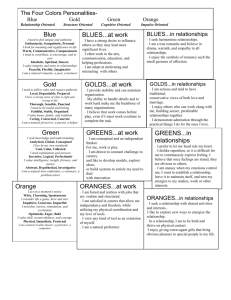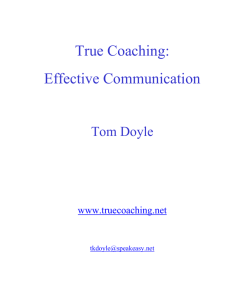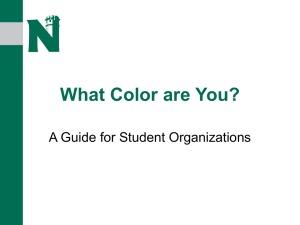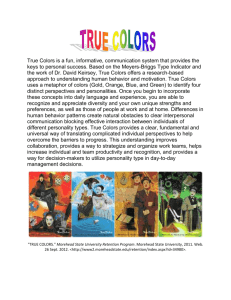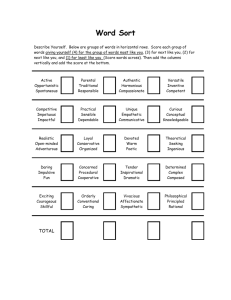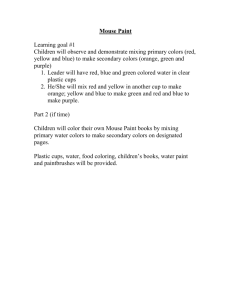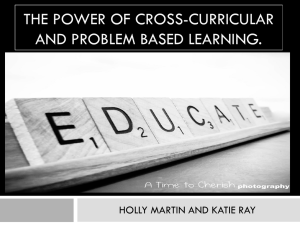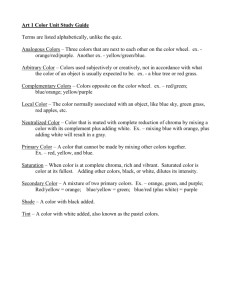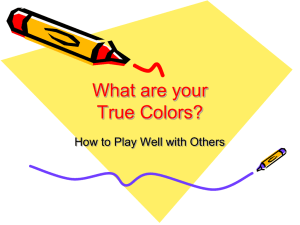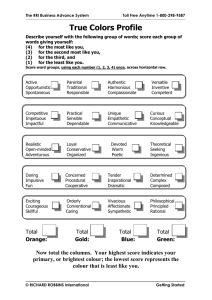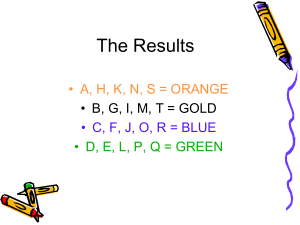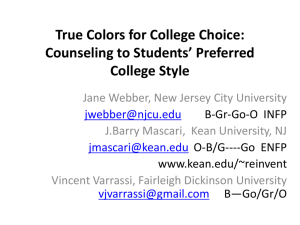BP Confernce Facione Breakout Session Leading in Tough Times
advertisement
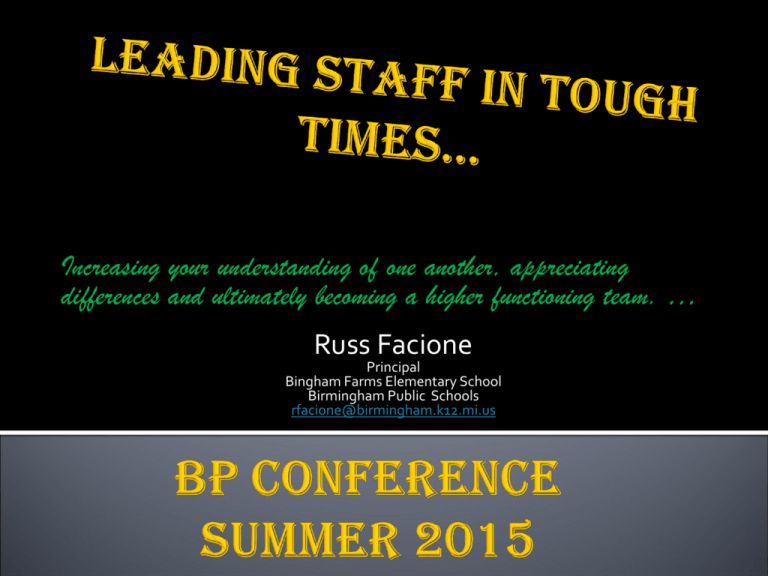
Increasing your understanding of one another, appreciating differences and ultimately becoming a higher functioning team. … Russ Facione Principal Bingham Farms Elementary School Birmingham Public Schools rfacione@birmingham.k12.mi.us Personal Note- Who is this guy?? Goal of Today▪ True Colors Refresher ▪ A little about who we are, how others understand us and how we understand others.. ▪ A Framework for Approaching new challenges as a Royal Oak group. Personal Note- Who is this guy?? Russ Facione- Born and raised in Metro Detroit. Wayne High, Western Michigan Taught in Wayne Westland, then Birmingham Administrator for past 16 years. Married for 20 years, 4 Daughters. Softball Coach, Parrothead, “Drama Dad”, Camper *Since our goal is building trust and increasing our understanding of one another, our connector is: At your tables: ▪ Question #1 “Who would play you in the movie about your life?” Discuss. ▪ Question #2 “What songs/CD/I-pod List is in your car right now” Discuss ▪ Do you need connector ideas with your staff ▪ http://russfacione.wikispaces.com/file/view/connectorextras.pdf You are in charge of yourself and your needs. Be an Active participant today. Keep an open mind to items discussed. Multi-tasking is an individual preference. Anything that comes up but not be tied directly to this goes in Parking Lot to be covered at the end. We will maintain our schedule and agenda Everything you see here and more is on my wiki at http://russfacione.wikispaces.com TRUST & Effective Communication These are the KEY! So, then…..how can we grow our mutual collective trust? When in a time of change there needs to be a feeling or mutual “we’re-in-this-together” You can achieve this by: 1. Knowing yourself as a leader 2. Know the OTHERS you work with to problem solve 3. Know those you supervise. That is where our journey begins…. Mr. Rogers had it right… you need to know who you are in the trenches with, building the mutual trust works only when you look inside yourself. What can you do? My favorite example is TRUE COLORS. Book list #1 Showing Our True Colors, Miscsin. What is it, how do you do it, and what do you do with the results? Staff fill out a quick sheet which has them match up trios of words that best describe how they would naturally approach something… Need to know each other to work together; To understand ourselves, How we seem to others and How they seem to us; Student Population vs. K-12 Educators WHAT DO YOU THINK? Kids Staff Blue _____ % ______ % Orange _____ % ______ % Green _____ % ______ % Gold _____ % ______ % * Important reminder- a person’s full color spectrum doesn’t take hold around 18-24 yrs. * General Student Population vs. K-12 Educators ANSWER KEY- FOR TYPICAL SCHOOL Kids Staff 38 % 38 % 12% 12 % 20 % 5% 5% 70 % Blue Orange Green Gold 38 % OF KIDS ARE ORANGE WHILE 70% OF STAFF ARE GOLD- THEY ARE OPPOSITE When you know what your core values are, you can perform at your highest level – and when you understand others, you have the basis to communicate and achieve common goals. Four COLORS- GOLD, BLUE, GREEN, ORANGE How do I determine my color spectrum? Dominant Color to a lowest color? You could have a pair--- you could have a more even spread, or one slam dunk dominant. 1. Read each trio of words across 4 = Word list most describes down to 1 = For the least describes; You will have five rows filled out, with 1234 in different sequences reading across. Active Opportunistic Spontaneous Competitive Impetuous Impactful 2 4 Parental Traditional Responsible Practical Sensible Dependable 3 2 Authentic Harmonious Compassionate Unique Empathetic Communicative 4 1 Versatile Inventive Competent Curious Conceptual Knowledgeable Realistic Open-Minded Adventuresome Loyal Conservative Organized Devoted Warm Poetic Theoretical Seeking Ingenious Daring Impulsive Fun Concerned Procedural Cooperative Tender Inspirational Dramatic Determined Complex Composed Exciting Courageous Skillful Orderly Conventional Caring Vivacious Affectionate Sympathetic Philosophical Principled Rational = = = 1 3 = 2. Then, take the four color sheets on the table, look at the picture on the front and the description on the back, see which one fits you best and rank them left to right: Orange Card, Gold Card, Blue Card, Green Card Label Under notes left to right Orange, Gold, Blue, Green Active Opportunistic Spontaneous Parental Traditional Responsible Authentic Harmonious Compassionate Versatile Inventive Competent Competitive Impetuous Impactful Practical Sensible Dependable Unique Empathetic Communicative Curious Conceptual Knowledgeable Realistic Open-Minded Adventuresome Loyal Conservative Organized Devoted Warm Poetic Theoretical Seeking Ingenious Daring Impulsive Fun Concerned Procedural Cooperative Tender Inspirational Dramatic Determined Complex Composed Exciting Courageous Skillful Orderly Conventional Caring Vivacious Affectionate Sympathetic Philosophical Principled Rational ORANGE BLUE GOLD = = GREEN = = 3. Now we will add each column going down… MAX is 24 for any one area—MIN is 6 Fill out your four color spectrum: Highest to lowest with totals; Active Opportunistic Spontaneous Competitive Impetuous Impactful Realistic Open-Minded Adventuresome Daring Impulsive Fun Exciting Courageous Skillful ORANGE 2 1 1 2 1 1 Parental Traditional Responsible Practical Sensible Dependable Loyal Conservative Organized Concerned Procedural Cooperative Orderly Conventional Caring GOLD 3 2 4 3 4 2 Authentic Harmonious Compassionate Unique Empathetic Communicative Devoted Warm Poetic Tender Inspirational Dramatic Vivacious Affectionate Sympathetic BLUE 4 4 3 4 3 4 Versatile Inventive Competent Curious Conceptual Knowledgeable Theoretical Seeking Ingenious Determined Complex Composed Philosophical Principled Rational GREEN 1 3 2 1 2 3 = = = = 8 18 22 12 Famous Folks in your color Your characteristics Your strengths Others may see you as: Primary Color What does it tell you? This indicates what you are MOST comfortable doing. Sometimes people order their cards in order of what they MUST do instead of what they PREFER to do. Example of the Ele School Principal who THOUGHT she was a GOLD but was really an ORANGE. Second Color - Quite important, often forgotten It has a major influence on your first. If you are introverted, it may be hard to tell which is 1 and which is 2. The first one may be processing things while the 2nd color is what the outside world sees…so take that into consideration if you are confused about yourself or others. (Ex: Myself GREEN & ORANGE) Third Color - May come in handy. If the first color is very dominant the 2nd and 3rd will be closely related to each other. Fourth Color - Significant, too. Your least natural soooo: ▪ You may admire them in others. ▪ You may conflict with them the most (esp. in others) This lack of understanding results in us criticizing instead of appreciating. ▪ We often tend to condemn what we’ve haven’t experienced or what we lack most in. It’s important to remember we have ALL 4 colors. Some have the rare Rainbow- All 4 spread evenly. HOW? Lots of life experiences that leads to a balanced temperament. They’ve intentionally worked at lesser colors over years. Also, they may be in a transition period in their life trying to figure themselves out. Maybe they’ve seldom had a chance to BE themselves and can’t remember what comes naturally. They are really a green and over-analyze things. Most of all, you are born with one temperament stronger than others it’s just a matter of finding it. Characteristics Problem Solver, “Why” Mentality, Very Complex, Standard Setter, Cool Calm Collected, Work = Play, Play = Work, Intellectual Competence Driven, Analytical, Global, Visionary Relationships through Logic Organizational Strengths Analyzing, Conceptualizing, Designing, Developing, Diagnosing, Intellectualizing, Inventing, Mapping out, Problem Solving, Reasoning, Researching, Thinking Others may see you as: Intellectual Snob, Arrogant, Heartless, Unrealistic, Eccentric / Weird, Unfeeling, Anti-Social, Cool, Aloof, Sarcastic, Critical, Lacking Mercy, Unappreciative Characteristics Caretaker, optimistic, Passionate, Dramatic, Enthusiastic, Imaginative, Cause Oriented, True Romantic, Unique, Cooperative over Competition, Spirituality, People Oriented, Peacemaker Strengths: Accepting, Communicating, Cooperating, Counseling, Creating, Guiding, Imagining, Intuition, Leading, Listening, Mentoring, Motivating, Recruiting, Speaking, Supporting, Teach, Tolerate, Others may see you as: Mushy, Over Emotional, Other-Worldly, Smothering, Unrealistic, Wishy-Washy, Bleeding Heart, Nosy, Talkative, Groveling, Manipulative, Characteristics Energetic, Desires Change, Playful, Master Negotiator, Natural Entertainer, Pushes Boundaries, “Just Do It” Accepts Challenges, Impulsive, Spontaneous, Immediate Feedback, Self Confident, Unstructured Strengths: Take Charge Ability, Care Free, Dealing w/ Chaos, Determination, Multi-task, Flexible, Hands-on, Negotiating, Direct Communication, Risk-Taking, Trouble Shooting, Welcome New Ideas Others may see you as: Rude, Irresponsible, Not Serious, Selfish Self Centered, Ignoring the Rules, Manipulative, Impatient, Flaky Easily Distracted, Unprepared, Flirtatious, Taking Advantage of Others Characteristics Prepared, Loves to Plan, Details Oriented, Punctual, Strong Sense of Duty Policies, Family Values, Traditions, Conservative Stable, Well Organized, Strong Right & Wrong Comfort with Structured Environment Strengths Accounting, Belonging, Caretaking, Collecting Data, Contributing, Coordinating, Dispatching, Family, Follow Directions, Guarding, Handling Details, Organizing, Planning Ahead, Securing, Supervising Others may see you as: Rigid, Restricted, Stubborn, Boring, Self Righteous, System-Bound, Unimaginative, Judgmental, Bossy, Uptight, Rigid Idea of Time, Married to Task Oranges Need- Action, Activity, Freedom, Flexibility, Variety, Fun & Play Blues Need- Acceptance, Harmony, Expression, Meaning, Understanding, Contribute, Validation Greens Need- Intellectual Stimulation, Time to Ponder, Information, Objectivity, to Question Golds Need- Consistency, Reliability, Structure, Timelines, Clarity, Closure, Respect, Rules At my school we have stickers on our mailboxes to subtly remind us. You could have a TC Spirit Day, staff wear their “color”. Make it a part of your building conversation. Celebrate your differences! Be open about working on your lowest. Stickers on mailboxes for instance, leads to a more open appreciation. Make it a risk-free part of the culture. Reflect and Reconnect: What can you do to enhance the relationships you have with those you work with or lead? How could you use this True Colors information to help with that? Share with neighbors around you. 1 minute. GO! Private Promise- Name 2 changes you will make with your staff this school year in regards to colors. Then monitor it and check in with yourself by December break. Now that you’ve connected, you’ve laughed you’ve deepened relationships… Meaningful Meetings with COLORS: Have an agenda, goal, and norms (GOLDS need this) Have an opportunity to talk, share & connect (BLUES need this) Have flexibility built in, activity, variety (ORANGES need this) Have research, articles, process time (GREENS need this) • Book List #2 “Facilitation with Ease”, Bens – Facilitation is a key in leading a meeting. – – – – Process (How) over Content (What) Get you flip charts ready! Group thought, etc; Actively listen Always have a Parking Lot – Begin Meetings with Connectors- These are activities to promote trust and focus on the work at hand. – Need LOTS of big paper and a process of documenting Group Thought, and of sharing it. – Difference between Dialogue and Discussion • Share “ZCI” and “Conensogram” Two examples – Levels of Decision Making when they come up. Connectors are key activities to open a meeting: They Build trust in the group, deepen relationships, increase emotional intelligence’ Open up relationships (like us today, we don’t know each other at all) Focus us on the work at hand in an active engaging fashion. And no one sleeps or is correcting papers! Some examples of 30 second Connectors… • • What if your topic was your grade level teams and developing norms, a connector could be: • “What was your best team experience growing up? What made it so positive?” Also, read the intimacy Other purpose of connectorslevel of the group – how well do they know each ▪ Build group energy other? ▪ Practice listening skills ▪ Create laughter ▪ Enhance trust ▪ Shared Purpose Now think amongst yourselves• A meeting, its purpose what could be a connector to design? Now that you’ve connected, you’ve laughed you’ve deepened relationships… Meaningful Meetings: Have an agenda, goal, and norms (GOLDS need this) Have an opportunity to share and connect (BLUES need this) Have flexibility built in, activity, variety (ORANGES need this) Have research, articles, process time (GREENS need this) A perfect example- CRUCIAL POINT- Your staff has an agenda item to review your mission statement or your values. Have you differentiated whether they are in… DISCUSSION or But aren’t those the same????? OH no!! DIALOGUE Such an important and often overlooked item! Be CLEAR with staff…. If you are in.. 1.Dialogue- We are openly talking and informing everyone, to gain a mutual understanding of all sides. Divergent 2.Discussion- We have reviewed all the sides and need to make a decision, reach consensus and move on. Convergent Now that you’ve gone through D&D, you now need to make sure you’ve established what level of decision making that the staff is in. Several Levels- Be clear!! Which level is this decision under? Level 1- I decide Level 2- I decide with input from you Level 3- We decide together Level 4- You decide with input from me. Level 5- You decide Basically there are three reasons people come and talk to you…..be comfortable asking for clarification. 1. Coach- I’m presenting to you a problem and I’d like to still own it, but I’d like your help. 2. Vent- I need to come and vent so I’ll feel better, just let me unload then I’ll be out of here! 3. Fix- I need you to solve this. So imagine if there is a gap….could get pretty frustrating for both parties involved. You must address parking lot concerns at the end of all meetings. Remember especially your BLUES need that validation and open communication. So what’s in our Parking Lot. This is all available on my Wiki http://russfacione.wikispaces.com Please contact me and I’d be happy to help via coaching copresenting or presenting for your building. Russ Facione- Principal Bingham Farms Elementary School 248 203 3388 Office rf03bps@birmingham.k12.mi.us
